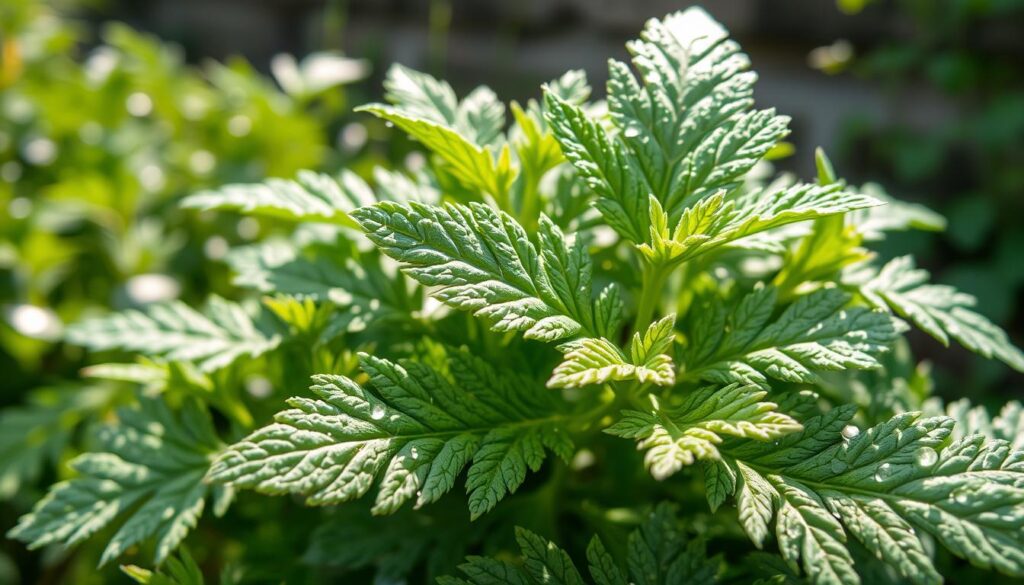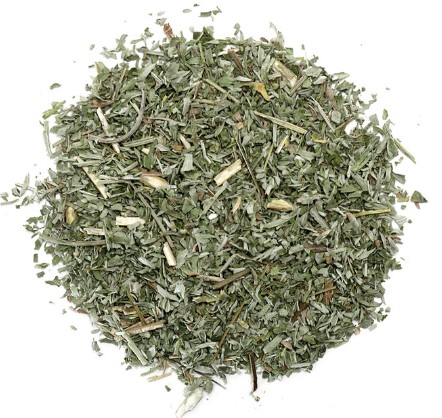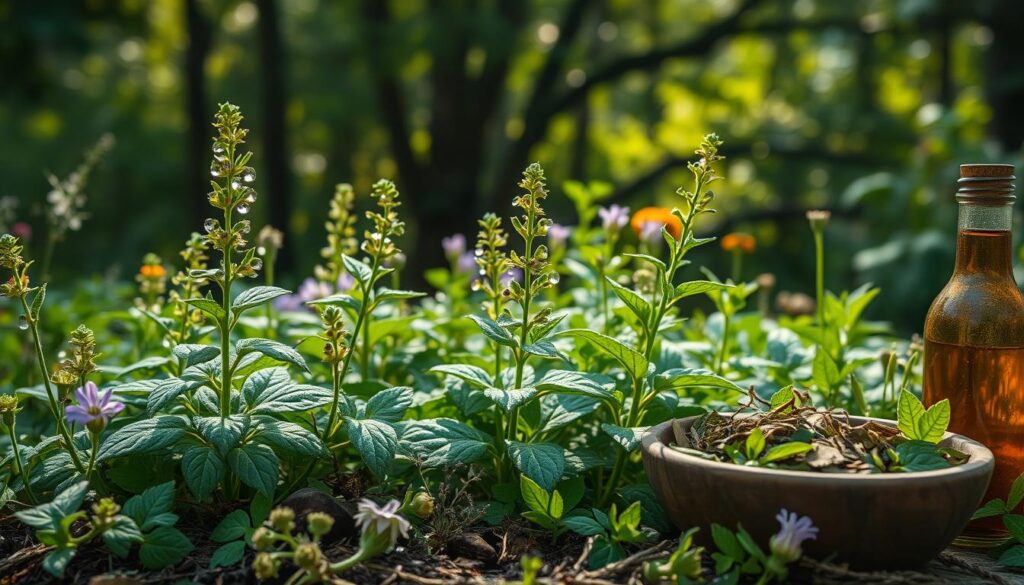Wormwood Benefits and Usage: Natural Health Guide
Wormwood, a versatile and time-honored herb, has long been revered for its remarkable health benefits. This comprehensive guide delves into the captivating world of wormwood, unveiling its origins, varieties, and the diverse ways in which this natural remedy can enhance your overall wellbeing. From supporting digestive function to harnessing its antimicrobial and antiparasitic properties, wormwood offers a holistic approach to natural health and wellness.

Key Takeaways
- Discover the fascinating history and origins of wormwood, a versatile herb with a rich heritage.
- Explore the various types and cultivars of wormwood, each with its unique characteristics and applications.
- Learn how wormwood can support healthy digestion and gut function, promoting overall wellness.
- Uncover wormwood’s powerful antimicrobial and antiparasitic properties, making it a valuable natural remedy.
- Understand the potential benefits of incorporating wormwood into your skincare routine for improved skin health.
- Familiarize yourself with safety guidelines and precautions for the safe and effective use of wormwood.
- Dive into the world of homemade wormwood remedies, including tinctures, teas, and other DIY recipes.
What is Wormwood?
Wormwood, scientifically known as Artemisia absinthium, is a perennial herb with a long history in traditional medicine. It originates from temperate regions of Europe and Asia. Its rich history spans ancient Greek and Roman civilizations.
Origins and History of Wormwood
The name “wormwood” comes from its use against intestinal worms. In ancient times, it was cultivated for its medicinal properties. Records of its use are found in ancient Egyptian, Greek, and Roman texts. Wormwood has been valued for its health benefits, used in various traditional remedies and herbal preparations.
Varieties and Types of Wormwood
There are several varieties and species of wormwood, each with unique characteristics and potential applications. Some of the most common types include:
- Artemisia absinthium, the common or green wormwood, known for its bitter taste and use in the production of absinthe liquor
- Artemisia annua, also known as sweet wormwood or annual wormwood, which has been studied for its potential antimalarial properties
- Artemisia vulgaris, or mugwort, which has been used in traditional Chinese medicine and is believed to have anti-inflammatory and digestive benefits
Each variety of wormwood offers unique chemical compositions and potential therapeutic applications. This makes wormwood a versatile and intriguing plant in the world of natural health and wellness.

Benefits of Wormwood and How to Use It
Wormwood, a versatile herb with a rich history, offers a wide range of benefits that can positively impact various aspects of your health. It supports digestive function and has antimicrobial and antiparasitic properties. This natural remedy presents a valuable addition to your wellness routine.
One of the primary benefits of wormwood is its ability to support healthy digestion. By incorporating wormwood into your diet through supplements, teas, or tinctures, you can help maintain a balanced gut microbiome. This promotes overall digestive well-being. Wormwood’s bitter compounds may also stimulate the production of digestive enzymes, aiding in the breakdown and absorption of nutrients.
In addition to its digestive benefits, wormwood is renowned for its antimicrobial and antiparasitic effects. Studies suggest that wormwood may be effective in combating various types of harmful microorganisms, including bacteria, fungi, and parasites. This makes it a valuable natural remedy for those seeking to maintain a healthy immune system and address certain infections or infestations.
To harness the benefits of wormwood, you can incorporate it into your daily routine in several ways:
- Supplements: Wormwood is available in capsule or tincture form, offering a convenient way to reap its benefits.
- Teas: Brewing a cup of wormwood tea can provide a soothing and restorative experience, while also delivering the herb’s therapeutic properties.
- Topical Applications: Wormwood can be used topically, such as in creams or ointments, to address skin-related concerns or promote wound healing.
It’s important to note that, as with any herbal supplement, it’s advisable to consult with a healthcare professional before incorporating wormwood into your regimen. This is especially true if you have any underlying health conditions or are taking medications. Proper dosage and usage guidelines should be followed to ensure safe and effective utilization of this powerful natural remedy.
| Wormwood Benefits | How to Use Wormwood |
|---|---|
| Supports Digestive Health | Supplements, Teas, Tinctures |
| Antimicrobial and Antiparasitic Properties | Supplements, Topical Applications |
| Promotes Immune System Health | Supplements, Teas |

“Wormwood has been used for centuries as a natural remedy, and its benefits continue to be recognized by modern science.”
Wormwood for Digestive Health
Wormwood is renowned for its role in supporting digestive health. This herb has been a cornerstone in traditional medicine for centuries. It helps with issues like bloating, indigestion, and poor nutrient absorption.
Supporting Healthy Gut Function
Wormwood’s compounds, such as artemisinin and thujone, have antimicrobial and anti-inflammatory effects. These properties help maintain a balanced gut microbiome. This balance is crucial for proper digestion and nutrient absorption, enhancing overall digestive function.
Adding wormwood for digestion and wormwood gut health to your routine can offer natural digestive support. It can be consumed as a supplement, brewed into tea, or used in cooking. Wormwood is a valuable asset for anyone looking to improve their digestive health.
“Wormwood has been used traditionally to help alleviate digestive issues and support overall gut health. Its unique properties make it a natural choice for those seeking to optimize their digestive well-being.”
By embracing wormwood, you can actively support wormwood gut health. This approach can lead to better digestive function and overall well-being.
Antimicrobial and Antiparasitic Properties
Wormwood, known for its diverse medicinal applications, has garnered significant attention for its impressive antimicrobial and antiparasitic properties. This versatile herb has demonstrated the ability to inhibit the growth of a wide range of harmful microbes. It makes it a valuable ally in the natural prevention and treatment of infections.
Studies have shown that wormwood extracts possess potent antimicrobial activity against a variety of bacteria, fungi, and viruses. The wormwood antimicrobial compounds, such as artemisinin and thujone, have been found to be effective in combating both Gram-positive and Gram-negative bacteria. This includes common pathogens like Escherichia coli, Staphylococcus aureus, and Salmonella species.
Moreover, wormwood has demonstrated remarkable wormwood antiparasitic properties, particularly in the fight against parasitic infections. Numerous scientific investigations have revealed wormwood’s ability to inhibit the growth and development of various parasites. This includes Giardia, Cryptosporidium, and Leishmania species.
| Pathogen | Wormwood’s Antimicrobial/Antiparasitic Activity |
|---|---|
| Escherichia coli | Effective in inhibiting the growth of this common bacterial pathogen |
| Giardia lamblia | Shown to be effective in treating giardiasis, a common parasitic infection |
| Candida albicans | Demonstrates antifungal properties against this opportunistic fungus |
The natural infection prevention properties of wormwood make it a valuable tool in supporting the body’s natural defenses against harmful microbes and parasites. By incorporating wormwood into one’s health regimen, individuals can leverage its antimicrobial and antiparasitic potentials. This promotes overall wellness and resilience.
“Wormwood has been used for centuries as a natural remedy for a variety of ailments, and its antimicrobial and antiparasitic properties are well-documented in scientific literature.”
Wormwood for Skin Health
Wormwood is known for its wide-ranging health benefits, including its potential for enhancing skin health. This versatile herb can be used in various ways, offering a natural solution for different skin issues.
Topical Applications of Wormwood
Wormwood is primarily used in skincare for its anti-inflammatory properties. It can soothe irritated, red, or inflamed skin. This makes it a valuable ingredient in lotions, salves, and other topical treatments.
Moreover, wormwood’s antimicrobial and antiseptic qualities make it effective against minor skin infections. It can prevent bacteria spread and aid in faster healing when applied topically.
The benefits of wormwood for skin health go beyond its medicinal properties. It is known for its soothing and cooling effects, which are great for sensitive or irritated skin. Wormwood-based products can offer relief from rashes, eczema, and some types of acne.
| Topical Uses of Wormwood | Benefits |
|---|---|
| Lotions and Salves | Anti-inflammatory, antimicrobial, soothing |
| Compresses and Poultices | Reducing inflammation, promoting healing |
| Aromatherapy Blends | Calming, stress-relieving |
With its diverse topical uses and potential for supporting natural skincare, wormwood is a valuable addition to any holistic skincare routine. Always consult with a healthcare professional before adding wormwood to your skincare regimen.
Potential Side Effects and Precautions
Wormwood is generally safe, but it’s crucial to know about wormwood side effects and follow wormwood safety guidelines. This herb, scientifically known as Artemisia absinthium, contains thujone. High doses of thujone can be toxic.
Safe Usage Guidelines
To ensure safe use of wormwood, follow these key recommendations:
- Begin with small doses and gradually increase as needed. High doses can cause adverse effects.
- Avoid prolonged, continuous use to prevent liver damage or nervous system issues.
- Pregnant and breastfeeding women, as well as children, should exercise caution. Consult a healthcare professional before using wormwood.
- Individuals with certain medical conditions, such as seizure disorders or liver disease, should avoid wormwood or use it under a healthcare provider’s guidance.
It’s also important to source high-quality, reputable wormwood products from reliable suppliers. This ensures purity and safety.
| Potential Wormwood Side Effects | Precautions |
|---|---|
| Digestive issues (nausea, vomiting, diarrhea) | Start with low doses and gradually increase as needed |
| Nervous system effects (tremors, seizures, headaches) | Avoid prolonged, continuous use |
| Liver damage | Consult a healthcare professional if you have liver disease |
| Allergic reactions | Discontinue use if any adverse reactions occur |
Understanding the potential risks and following safe usage guidelines allows you to enjoy wormwood’s benefits while minimizing wormwood side effects. Always consult with a healthcare professional before adding wormwood to your regimen.
Growing and Harvesting Wormwood
For those interested in incorporating wormwood into their natural health regimen, learning how to grow and harvest the herb can be a rewarding experience. Wormwood, scientifically known as Artemisia absinthium, is a hardy perennial plant that thrives in a variety of climates. This makes it a versatile choice for home gardens and small-scale cultivation.
Ideal Growing Conditions
Wormwood prefers well-drained, slightly alkaline soil and full sun exposure. It can tolerate a range of soil types, from sandy to clay, as long as the drainage is adequate. The plant is drought-tolerant and can even grow in poor, rocky soils. This makes it a low-maintenance option for those with limited gardening space.
Planting and Cultivation
- Wormwood can be propagated from seed or through division of existing plants.
- When planting from seed, sow the seeds directly into the ground in the spring or early summer, ensuring they have adequate moisture to germinate.
- Space the plants about 18-24 inches apart to allow for proper growth and air circulation.
- Regularly prune the plants to encourage bushy growth and prevent them from becoming leggy.
Harvesting Wormwood
The best time to harvest wormwood is just before the plant flowers, typically in mid-to-late summer. Simply snip the leaves and stems, leaving a few inches of growth at the base to allow for regrowth. Dry the harvested wormwood in a well-ventilated, shaded area. Store the dried leaves and stems in an airtight container for future use.
| Wormwood Cultivation Tips | Wormwood Harvesting Tips |
|---|---|
| Well-draining, alkaline soil Full sun exposure Propagate from seed or division Space plants 18-24 inches apart Regularly prune to encourage bushy growth | Harvest before flowering, in mid-to-late summer Snip leaves and stems, leaving a few inches of growth Dry the harvested wormwood in a well-ventilated, shaded area Store dried leaves and stems in an airtight container |
With the right growing conditions and proper harvesting techniques, wormwood can be a rewarding addition to your home garden or small-scale cultivation project. By following these guidelines, you can ensure a steady supply of this versatile and beneficial herb for your natural health needs.
Wormwood Recipes and Remedies
Wormwood, a versatile herb, is known for its therapeutic properties. It can be easily incorporated into various homemade remedies and recipes. Whether you’re looking to harness its antimicrobial, digestive, or skin-nourishing benefits, wormwood offers a natural solution. You can prepare it right at home.
DIY Wormwood Tinctures and Teas
Creating your own wormwood tinctures and teas is simple and effective. To make a wormwood tincture, steep dried herb in high-proof alcohol, like vodka or brandy, for weeks. Strain and bottle the tincture for easy daily use. For a soothing wormwood tea, steep fresh or dried leaves in hot water for 5-10 minutes, then strain and enjoy.
Both wormwood tinctures and teas can support digestive health, combat parasites, and promote overall well-being. Experiment with different methods to find the preparation that works best for you.
| Wormwood Remedy | Benefits | Preparation |
|---|---|---|
| Wormwood Tincture | Antimicrobial, antioxidant, anti-inflammatory | Steep dried wormwood in high-proof alcohol for 2-4 weeks, then strain and bottle |
| Wormwood Tea | Digestive support, parasitic elimination, skin health | Steep fresh or dried wormwood leaves in hot water for 5-10 minutes, then strain |
Incorporating wormwood recipes and wormwood remedies into your daily routine can be powerful. Whether you prefer a soothing wormwood tea or a potent homemade wormwood tincture, the possibilities are endless. Unlock the healing powers of wormwood in your life.
Conclusion
In this comprehensive guide, we’ve delved into the remarkable benefits and diverse applications of wormwood. This herb, with a rich history in traditional medicine, offers a natural solution for many health concerns. It supports digestive health and boasts antimicrobial and antiparasitic properties.
Whether you opt for supplements, teas, or homemade remedies, this guide equips you to use wormwood for your well-being. You now have the knowledge to integrate this natural health powerhouse into your life. The insights and recommendations provided empower you to explore the wormwood benefits fully.
The path to optimal health is unique to each individual, and wormwood can be a valuable ally. We hope this guide has inspired you to harness wormwood’s natural healing properties. It encourages you to embark on a journey towards improved wellness and vitality.
FAQ
What is wormwood and where does it come from?
Wormwood, scientifically known as Artemisia absinthium, is a perennial herb native to temperate Europe and Asia. It has a rich history, dating back to ancient Greek and Roman civilizations.
What are the different varieties and types of wormwood?
Wormwood comes in several varieties, each with unique characteristics and uses. Common types include green wormwood, silver wormwood, and Roman wormwood.
How can wormwood benefit my health?
Wormwood offers numerous health benefits. It supports digestive health, exhibits antimicrobial and antiparasitic effects, and may benefit skin health.
How can wormwood help with digestive issues?
Wormwood is known for supporting healthy gut function. It’s traditionally used to alleviate bloating, indigestion, and poor nutrient absorption.
What are the antimicrobial and antiparasitic properties of wormwood?
Wormwood’s antimicrobial and antiparasitic properties make it a valuable ally against harmful microbes and parasites. It can inhibit pathogen growth and support the body’s defenses.
How can wormwood be used for skin health?
Wormwood benefits the skin as well as internal health. It may help with inflammation, rashes, and minor infections. It can be used in lotions, salves, and other skincare products.
Are there any potential side effects or precautions to consider when using wormwood?
While wormwood is generally safe, it’s crucial to be aware of potential side effects. Pregnant or nursing women should exercise caution when using wormwood-based products.
How can I grow and harvest my own wormwood?
Growing and harvesting wormwood can be a rewarding experience. Understanding ideal growing conditions, planting techniques, and harvesting methods is essential.
What are some DIY wormwood recipes and remedies I can try?
Wormwood can be used in homemade remedies and recipes. You can create wormwood-based tinctures, teas, and other preparations for your natural health routine.
